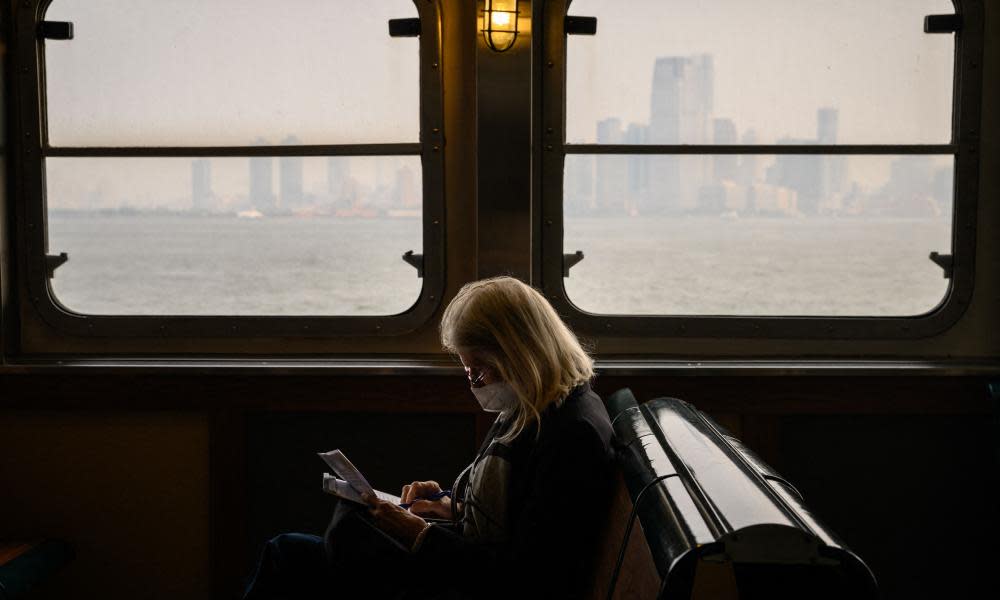‘It’s too much’: New Yorkers don masks or stay inside amid smog crisis

Irania Sanchez, 53, was gasping for breath during her walk in the New York City borough of Queens on Wednesday morning. The air was thick and smelled of the smoke that had descended over the metropolis and a swath of the US.
She was on her way to visit a friend who recently had surgery but then wanted to go on a walk with Sanchez.
Related: At a glance: what you need to know about Canada wildfires and smoky US skies
“I said don’t go out, it’s too dangerous for you,” Sanchez told the Guardian, supporting herself on her walking stick.
As a cleaning truck went by, sweeping dust into the air, Sanchez gasped and moved away. “It’s too much, it’s too much,” she said.
The whole city is immersed in a dystopian-looking smog: urban streets in sepia, emptier than usual, bathed in an eerie quiet. More were seen wearing face masks than usual these days, reminiscent of earlier days of the Covid-19 pandemic – and the feeling of potential doom the virus had induced.
Across the river, in midtown Manhattan, which is usually filled with tourists at this time of the year enjoying the spring weather, there were suddenly fewer people and cars and more surgical masks than usual.
Wednesday marked the second day of the smog crisis in New York, after smoke from Canada’s enormous and early-season wildfires drifted south across more than a dozen US states late on Tuesday into Wednesday, putting more than 50 million people under air quality alerts.
The US Environmental Protection Agency (EPA) issued a poor air quality alert for New England, a day after parts of Illinois, Wisconsin and Minnesota received a similar advisory. Last week, US officials as far south as Maryland, Virginia and Pennsylvania reported being affected by the wildfires up north. On Wednesday, New York’s LaGuardia airport in Queens grounded planes because visibility became so poor.
Sanchez learned about the smog on Tuesday evening on the news, she said, and when her five-year-old grandson came home coughing.
But he had to go to school the next day, because “if he don’t go, it’s problem”, she laughed. “But I worry, because I don’t want people dying,” she added.
At a nearby school in the neighbourhood, students were leaving early because they had their prom dance in the evening.
Danna Herrera, an eighth-grade student, was on her way home with her mother a little before noon.
Her school wrote to parents saying that any outdoor activities were cancelled for the day. Today they were scheduled for “field day”, which would normally mean they spend the whole day outdoors.
It was cancelled, but Herrera is relieved that their prom is indoors and won’t be affected.
Meanwhile, Angely Hartnack, 25, and Katherine Rodriguez, 27, were taking their lunch break in Manhattan with masks on.
They had not worn masks during the pandemic, they said, but donned them on Wednesday.
Hartnack said she learned about the unhealthy air quality on Tuesday when it was “smoky” and she was wondering why the air looked “very faint”.
Her car had filled with the pungent air. “It just looked very sticky,” she said.
Rodriguez said there was smoke residue on her car as well.
She said they did not receive any instruction from their workplace about staying home, so they came in.
Not far away, Lawrence Perkins, 40, was selling boxer shorts, T-shirts, and other items but he was concerned about his body, and was ready to cut the work day short under glowing yellow skies.
“The smoke smells as if it’s just a block away or two,” he said. “It’s very strong, it’s pretty heavy. Just trying to breathe this in is not healthy, I don’t even think anybody should’ve came out,” he added, musing that perhaps it should have been declared a national day off.
Vincent Stevenson, 70, who sells flags on the sidewalk, chimed in: “They were saying this morning on the news if you don’t have to go outside, stay home.” But he had to come out as he is a mobile vendor, he said.
Perkins had been out for just four hours, and his sale was significantly lower than normal, he said.
“I’d rather just stay home but in the meantime I’ll do a little bit of something,” he said, “but if I feel like it’s getting abrasive to my respiratory system, I’ll stop.”

